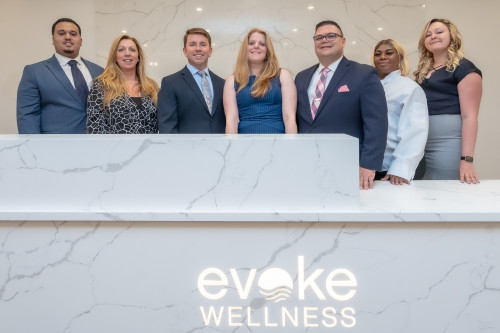
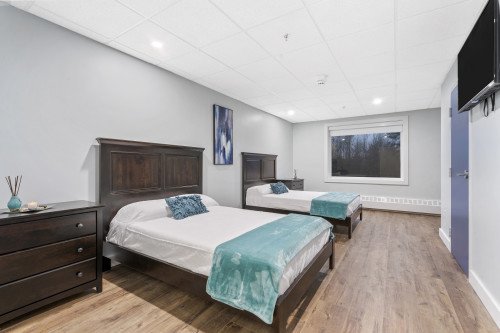
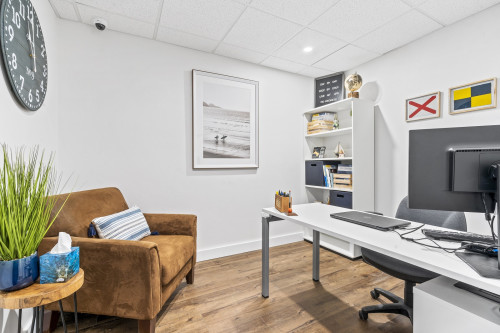



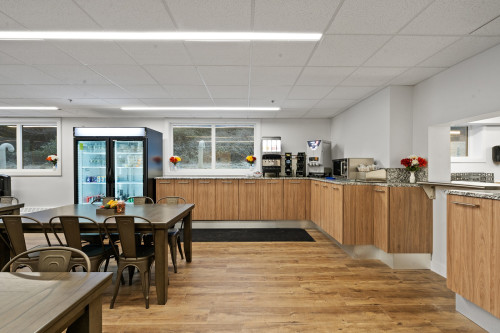
Harborview Treatment & Detox
Verified Center
This provider's information has been quality-checked by Recovery.com's Research Team for accuracy and completeness, including center verification through appropriate third-party organizations.
Treatment Focus
This center treats substance use disorders and mental health conditions. You'll receive individualized care catered to your unique situation and diagnosis, learn practical skills for recovery, and make new connections in a restorative environment.
Primary Level of Care
Offering intensive care with 24/7 monitoring, residential treatment is typically 30 days and can cover multiple levels of care. Length can range from 14 to 90 days typically.
Treatment Focus
This center treats substance use disorders and mental health conditions. You'll receive individualized care catered to your unique situation and diagnosis, learn practical skills for recovery, and make new connections in a restorative environment.
Primary Level of Care
Offering intensive care with 24/7 monitoring, residential treatment is typically 30 days and can cover multiple levels of care. Length can range from 14 to 90 days typically.
Provider's Policy
To make sure you fully understand your benefits, we suggest reaching out to your insurance carrier directly. We're here to help with any questions you might have. Feel free to explore our website for more information on insurance options that might be right for you.
Harborview Treatment & Detox
Harborview Treatment & Detox
About Harborview Treatment & Detox
Harborview Treatment & Detox (previously called Evoke Wellness) is a residential addiction treatment program located outside of Boston in a safe, supportive environment where clients are treated with respect. They offer detox, intensive inpatient, and residential care for men and women who have been struggling with a wide range of addiction types and severities. Their addiction treatment specialists and mental health counselors deliver evidence-based care tailored to each clients’ unique needs, helping them heal mentally, physically, and emotionally.
Heal with Evidence-Based Therapies and Holistic Care
Harborview Treatment takes a comprehensive and compassionate approach to addiction and mental health treatment, promoting healing and stability in the body, mind, and spirit. They offer evidence-based therapies like cognitive behavioral therapy (CBT), family counseling, and relapse prevention alongside holistic practices such as yoga and mindfulness. Their team of licensed physicians, therapists, and counselors collaborate to provide 24/7 medical care, personalized support, and a structured environment for recovery. With many staff members in long-term recovery themselves, Evoke inspires hope and resilience.
24/7 Support During Treatment, Plus Ongoing Care
Evoke Wellness at Cohasset supports clients throughout their entire recovery journey. Their inpatient addiction treatment programs offer a safe, substance-free environment with around-the-clock medical supervision and support. In the medical detox unit, each client is under continuous supervision to minimize withdrawal symptoms. Additionally, their team of behavioral health technicians is available at all times to assist patients and clients. As clients transition back to life outside of treatment, the team helps them develop a personalized plan for ongoing success. Clients become part of the Evoke Wellness at Cohasset family for life. Their alumni program provides continued support, hosting events and offering resources to help clients maintain their recovery.
Feel at Home in a Bright & Peaceful Setting
Harborview Treatment offers bright, modern accommodations designed to provide comfort and tranquility during recovery. Patients flying in for treatment are greeted by a team member and transported to the center, which is surrounded by trees in a beautiful neighborhood. With private or shared rooms featuring en suite bathrooms, daily housekeeping, and amenities like chef-prepared meals, a snack bar, and an outdoor lounge, the center ensures a relaxing and supportive environment. Walking trails and common areas provide additional spaces for reflection and healing.

Highlights from the Center
Highlights
These highlights are provided by and paid for by the center.
Medically Assisted Detox
Addiction Recovery
Trauma Treatment
Center Overview
Treatment Focus
This center treats substance use disorders and mental health conditions. You'll receive individualized care catered to your unique situation and diagnosis, learn practical skills for recovery, and make new connections in a restorative environment.
Joint Commission Accredited
The Joint Commission accreditation is a voluntary, objective process that evaluates and accredits healthcare organizations (like treatment centers) based on performance standards designed to improve quality and safety for patients. To be accredited means the treatment center has been found to meet the Commission's standards for quality and safety in patient care.

Insurance Accepted
Cash Pay Rates
Estimated Cash Pay Rate
Center pricing can vary based on program and length of stay. Contact the center for more information. Recovery.com strives for price transparency so you can make an informed decision.
Meet Your Care Team

Jordan Dupree
Director of Admissions

Jillian Weche
Director of Nursing

Mike Tarantino
National Accounts Director

Nicholas Dean
Program Director

Rebecca Kulesza
Clinical Therapist
LCSW

Suzette Shilts
Clinical Therapist
LMHC
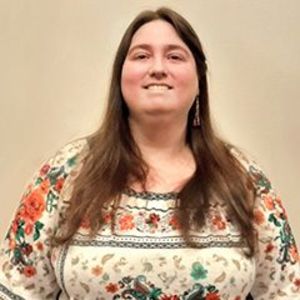
Tracy Reff
ATR Art Therapist

Vashawn Thurston
Executive Chef

Dr. David Kashan
Chief Medical Director
MD

Maureen McMahon
Clinical Director
MS, MBA, LADC-1
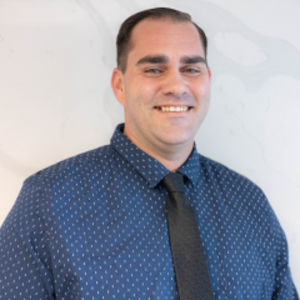
Travis Fantauzzi
Director of Operations

James Cook
Operations Supervisor

Mariama Ajanaku
CSS Clinical Therapist

Lejaun Pope
Clinical Therapist

Melissa Darling
Clinical Therapist

Ryan Daly
ATS Program Director

SGT Steven P. Laine (SARGE)
Veteran Case Manager

Katie O'Neill
CSS Clinical Therapist
Levels of Care







Your Care Options
Specializations
Alcohol
Using alcohol as a coping mechanism, or drinking excessively throughout the week, signals an alcohol use disorder.
Detox
Detox fully and safely removes toxic substances from the body, allowing the next steps in treatment to begin with a clean slate.
Benzodiazepines
Benzodiazepines are prescribed to treat anxiety and sleep issues. They are highly habit forming, and their abuse can cause mood changes and poor judgement.
Co-Occurring Disorders
A person with multiple mental health diagnoses, such as addiction and depression, has co-occurring disorders also called dual diagnosis.
Drug Addiction
Drug addiction is the excessive and repetitive use of substances, despite harmful consequences to a person's life, health, and relationships.
Ecstasy
Ecstasy is a stimulant that causes intense euphoria and heightened awareness. Abuse of this drug can trigger depression, insomnia, and memory problems.
Heroin
Heroin is a highly addictive and illegal opioid. It can cause insomnia, collapsed veins, heart issues, and additional mental health issues.
Opioids
Opioids produce pain-relief and euphoria, which can lead to addiction. This class of drugs includes prescribed medication and the illegal drug heroin.
Who We Treat
LGBTQ+
Addiction and mental illnesses in the LGBTQ+ community must be treated with an affirming, safe, and relevant approach, which many centers provide.
Men and Women
Men and women attend treatment for addiction in a co-ed setting, going to therapy groups together to share experiences, struggles, and successes.
Veterans
Patients who completed active military duty receive specialized treatment focused on trauma, grief, loss, and finding a new work-life balance.
Approaches
Evidence-Based
A combination of scientifically rooted therapies and treatments make up evidence-based care, defined by their measured and proven results.
Holistic
A non-medicinal, wellness-focused approach that aims to align the mind, body, and spirit for deep and lasting healing.
Individual Treatment
Individual care meets the needs of each patient, using personalized treatment to provide them the most relevant care and greatest chance of success.
Twelve Step
Incorporating spirituality, community, and responsibility, 12-Step philosophies prioritize the guidance of a Higher Power and a continuation of 12-Step practices.
Therapies
1-on-1 Counseling
Patient and therapist meet 1-on-1 to work through difficult emotions and behavioral challenges in a personal, private setting.
Meditation & Mindfulness
A practiced state of mind that brings patients to the present. It allows them to become fully aware of themselves, their feelings, and the present moment.
Art Therapy
Visual art invites patients to examine the emotions within their work, focusing on the process of creativity and its gentle therapeutic power.
Family Therapy
Family therapy addresses group dynamics within a family system, with a focus on improving communication and interrupting unhealthy relationship patterns.
Medication-Assisted Treatment
Combined with behavioral therapy, prescribed medications can enhance treatment by relieving withdrawal symptoms and focus patients on their recovery.
Relapse Prevention Counseling
Relapse prevention counselors teach patients to recognize the signs of relapse and reduce their risk.
Relaxation Therapy
Muscle relaxation techniques relax mind and body. They can easily be practiced outside treatment, making it a valuable coping tool for continued recovery.
Conditions We Treat
Grief and Loss
Grief is a natural reaction to loss, but severe grief can interfere with your ability to function. You can get treatment for this condition.
Substances We Treat
Alcohol
Using alcohol as a coping mechanism, or drinking excessively throughout the week, signals an alcohol use disorder.
Benzodiazepines
Benzodiazepines are prescribed to treat anxiety and sleep issues. They are highly habit forming, and their abuse can cause mood changes and poor judgement.
Chronic Relapse
Consistent relapse occurs repeatedly, after partial recovery from addiction. This condition requires long-term treatment.
Co-Occurring Disorders
A person with multiple mental health diagnoses, such as addiction and depression, has co-occurring disorders also called dual diagnosis.
Cocaine
Cocaine is a stimulant with euphoric effects. Agitation, muscle ticks, psychosis, and heart issues are common symptoms of cocaine abuse.
Drug Addiction
Drug addiction is the excessive and repetitive use of substances, despite harmful consequences to a person's life, health, and relationships.
Ecstasy
Ecstasy is a stimulant that causes intense euphoria and heightened awareness. Abuse of this drug can trigger depression, insomnia, and memory problems.
Heroin
Heroin is a highly addictive and illegal opioid. It can cause insomnia, collapsed veins, heart issues, and additional mental health issues.
Languages
Aftercare
Care Designed for Your Needs
Personal Amenities
Amenities
Special Considerations
Gender-specific groups
Patients in gender-specific groups gain the opportunity to discuss challenges unique to their gender in a comfortable, safe setting conducive to healing.
Activities
Off-Site Activities

What people are saying
Treatment
3.7
Accommodations
3.7
Food & Nutrition
3.7
Value
3.2
Cons
- Shallow Post-Treatment Planning (2)
George Morris
Treatment in 2024 • (18 days) • Reviewed 03/07/24
Former Client
•Mobile detailing
•Bristol pa
George
Reviewed 01/05/24
Review from Rehabs.com
DA
Treatment in 2023 • (7 days) • Reviewed 11/27/23
Former Client
•Medical Sales Manager





